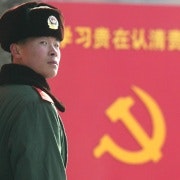Hong Kong edges towards an end game
Time finally seems to be running out for Hong Kong's pro-democracy protesters, as a confluence of events this week suggests their long face off with the government is reaching an endgame.
On Sunday, Hong Kong chief executive CY Leung met with Chinese President Xi Jinping in Beijing. We do not know exactly what was said or what assurances Leung may have given Xi, but we do know that on the following day, mainland Chinese authorities announced that the delayed Shanghai-Hong Kong Stock Connect program allowing reciprocal trading across the Hong Kong and Shanghai stock exchanges would finally commence next Monday 17th November.
On the same day, the Hong Kong High Court agreed to finalize interim injunctions that had been obtained by taxi and minibus companies against the protesters, requiring them to clear blockaded roads in "occupied" areas, and authorizing bailiffs to request police to assist in enforcement of the injunctions.
Monday's court ruling does nothing to change the legal position of the protesters. Their protests already constitute unlawful assemblies under Hong Kong's public order laws, and protesters could be arrested by police at any time. The injunction merely adds the additional offense of their also being in contempt of court.
What the court ruling does do, however, is provide political cover for the government. Now, clearing the protesters by force can be justified with appeals to the need to uphold the "rule of law".
This attempt to force a legal solution to a political problem is clearly unsatisfactory, and the government use of "rule of law" as justification for any action now after weeks of inaction appears hypocritical and disingenuous to say the least.
It is clear that the Hong Kong government has failed all sides in this debate. From the point of view of those who support the protesters, the government has refused to enter into meaningful discussion or engagement, and turned a deaf ear to their numerous concerns - political, social and economic. From the point of view of those who oppose the protesters, the government has failed to take any effective action to end the protests.
The weeks of policy paralysis have led to increasing frustration on all sides, creating a dangerous and ultimately unsustainable situation.
Something has to give sooner or later, and with the end of APEC meetings in Beijing on Wednesday, the foreign guests that might have asked awkward questions have gone home.
From here events seem likely to unfold in one of three ways:
The first, and least likely option is that the government and protest leaders may reach a negotiated agreement for protesters to withdraw. There are however numerous obstacles to this happening.
The protest groups are heterogeneous and without a centralized leadership. Even if the student groups leading the Admiralty-based occupation agree to retreat, there is no assurance that protesters in Mong Kok would agree to do likewise. Posters in Mong Kok make it very clear: "Hong Kong Federation of Students does not represent us".
In any event, none of the protest leaders could condone leaving willingly with nothing to show for their past weeks of efforts. They would need some form of concession from the government to enable a graceful exit.
The government however is showing no signs of doing that. Chief Secretary Carrie Lam stated this week that the government saw no scope for further negotiations with the students. And in any event, none of the protesters' core demands is acceptable to Beijing.
So there is no one to negotiate with and nothing is negotiable.
The second possibility is that, as the weather gets colder and protesters become increasingly dispirited, their numbers will dwindle. This would make an eventual clearance action much easier, and much less violent. Up until now, the Hong Kong government strategy seemed focused on this option.
However, Hong Kong government rhetoric in recent days has hardened, and the events of this past week suggest that the government is now considering the third option: instructing police to clear the protest zones by force. This will take large numbers of police, and they will need to do a better job of it than their previous attempts. Past displays of force by the Hong Kong police have provoked public anger and increased numbers of people coming out onto the streets. Crowds have quickly re-gathered after having been dispersed, as happened in the previous attempt to clear the Mong Kok protest site several weeks ago. It will take significant force and a serious and sustained operation to ensure a lasting peace on the streets.
Protest leaders however seem to have accepted the inevitability of a forced end to their protest. Occupy Central leaders announced in recent days that they intend to voluntarily surrender to police in a week's time if they are not arrested attempting to prevent execution of the injunctions.
Protesters are now bracing for an end to this current phase of their action. However it seems unlikely that this will also mean the end of their movement. The remaining question is what will be next.
Antony Dapiran is a Hong Kong-based international lawyer. You can follow his photographs and ongoing commentary on the events in Hong Kong on Twitter @antd.
















